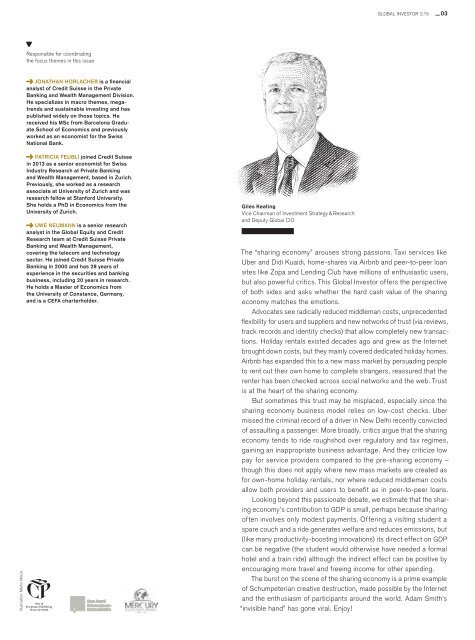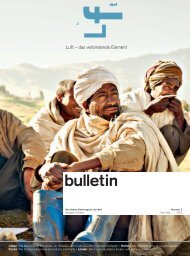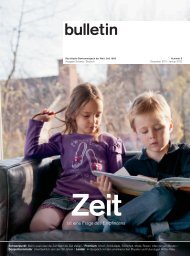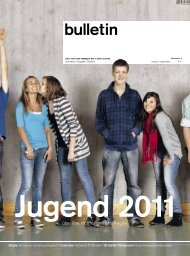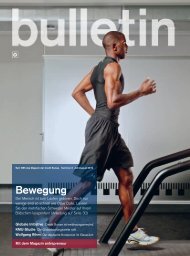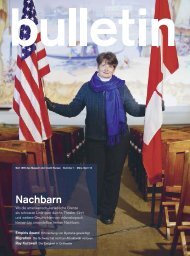The sharing economy
New opportunities, new questions Global Investor, 02/2015 Credit Suisse
New opportunities, new questions
Global Investor, 02/2015
Credit Suisse
Create successful ePaper yourself
Turn your PDF publications into a flip-book with our unique Google optimized e-Paper software.
GLOBAL INVESTOR 2.15 — 03<br />
Responsible for coordinating<br />
the focus themes in this issue<br />
JONATHAN HORLACHER is a financial<br />
analyst of Credit Suisse in the Private<br />
Banking and Wealth Management Division.<br />
He specializes in macro themes, megatrends<br />
and sus tainable investing and has<br />
published widely on those topics. He<br />
received his MSc from Barcelona Graduate<br />
School of Economics and previously<br />
worked as an economist for the Swiss<br />
National Bank.<br />
Illustration: Martin Mörck<br />
PATRICIA FEUBLI joined Credit Suisse<br />
in 2013 as a senior economist for Swiss<br />
Industry Research at Private Banking<br />
and Wealth Management, based in Zurich.<br />
Previously, she worked as a research<br />
associate at University of Zurich and was<br />
research fellow at Stanford University.<br />
She holds a PhD in Economics from the<br />
University of Zurich.<br />
UWE NEUMANN is a senior research<br />
analyst in the Global Equity and Credit<br />
Research team at Credit Suisse Private<br />
Banking and Wealth Management,<br />
covering the telecom and technology<br />
sector. He joined Credit Suisse Private<br />
Banking in 2000 and has 28 years of<br />
experience in the securities and banking<br />
business, including 20 years in research.<br />
He holds a Master of Economics from<br />
the University of Constance, Germany,<br />
and is a CEFA charterholder.<br />
Giles Keating<br />
Vice Chairman of Investment Strategy & Research<br />
and Deputy Global CIO<br />
<strong>The</strong> “<strong>sharing</strong> <strong>economy</strong>” arouses strong passions. Taxi services like<br />
Uber and Didi Kuaidi, home-shares via Airbnb and peer-to-peer loan<br />
sites like Zopa and Lending Club have millions of enthusiastic users,<br />
but also powerful critics. This Global Investor offers the perspective<br />
of both sides and asks whether the hard cash value of the <strong>sharing</strong><br />
<strong>economy</strong> matches the emotions.<br />
Advocates see radically reduced middleman costs, unprecedented<br />
flexibility for users and suppliers and new networks of trust (via reviews,<br />
track records and identity checks) that allow completely new transactions.<br />
Holiday rentals existed decades ago and grew as the Internet<br />
brought down costs, but they mainly covered dedicated holiday homes.<br />
Airbnb has expanded this to a new mass market by persuading people<br />
to rent out their own home to complete strangers, reassured that the<br />
renter has been checked across social networks and the web. Trust<br />
is at the heart of the <strong>sharing</strong> <strong>economy</strong>.<br />
But sometimes this trust may be misplaced, especially since the<br />
<strong>sharing</strong> <strong>economy</strong> business model relies on low-cost checks. Uber<br />
missed the criminal record of a driver in New Delhi recently convicted<br />
of assaulting a passenger. More broadly, critics argue that the <strong>sharing</strong><br />
<strong>economy</strong> tends to ride roughshod over regulatory and tax regimes,<br />
gaining an inappropriate business advantage. And they criticize low<br />
pay for service providers compared to the pre-<strong>sharing</strong> <strong>economy</strong> –<br />
though this does not apply where new mass markets are created as<br />
for own-home holiday rentals, nor where reduced middleman costs<br />
allow both providers and users to benefit as in peer-to-peer loans.<br />
Looking beyond this passionate debate, we estimate that the <strong>sharing</strong><br />
<strong>economy</strong>’s contribution to GDP is small, perhaps because <strong>sharing</strong><br />
often involves only modest payments. Offering a visiting student a<br />
spare couch and a ride generates welfare and reduces emissions, but<br />
(like many productivity-boosting innovations) its direct effect on GDP<br />
can be negative (the student would otherwise have needed a formal<br />
hotel and a train ride) although the indirect effect can be positive by<br />
encouraging more travel and freeing income for other spending.<br />
<strong>The</strong> burst on the scene of the <strong>sharing</strong> <strong>economy</strong> is a prime example<br />
of Schumpeterian creative destruction, made possible by the Internet<br />
and the enthusiasm of participants around the world. Adam Smith’s<br />
“invisible hand” has gone viral. Enjoy!


